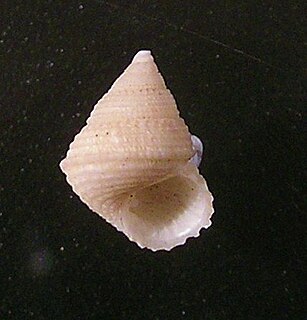
Streptococcus is a genus of gram-positive coccus or spherical bacteria that belongs to the family Streptococcaceae, within the order Lactobacillales, in the phylum Firmicutes. Cell division in streptococci occurs along a single axis, so as they grow, they tend to form pairs or chains that may appear bent or twisted. This differs from staphylococci, which divide along multiple axes, thereby generating irregular, grape-like clusters of cells. Most streptococci are oxidase-negative and catalase-negative, and many are facultative anaerobes.

The Philippine Sea is a marginal sea of the Western Pacific Ocean east of the Philippine archipelago, occupying an estimated surface area of 5 million square kilometers. The Philippine Sea Plate forms the floor of the sea. Its western border is the first island chain to the west, comprising the Ryukyu Islands in the northwest and Taiwan in the west. Its southwestern border comprises the Philippine islands of Luzon, Catanduanes, Samar, Leyte and Mindanao. Its northern border comprises the Japanese islands of Honshu, Shikoku and Kyūshū. Its eastern border is the second island chain to the west, comprising the Bonin Islands and Iwo Jima in the northeast, the Mariana Islands in the due east, and Halmahera, Palau, Yap and Ulithi in the southeast. Its southern border is Indonesia's Morotai Island.

Elephant seals are large, oceangoing earless seals in the genus Mirounga. The two species, the northern elephant seal and the southern elephant seal, were both hunted to the brink of extinction by the end of the 19th century, but their numbers have since recovered. They are the largest extant carnivorans.

In studies of social animals, the highest ranking individual of a dominance hierarchy is sometimes designated as the alpha. Males, females, or both, can be alphas, depending on the species. Where one male and one female fulfill this role together, they are sometimes referred to as the alpha pair. Other animals in the same social group may exhibit deference or other species-specific subordinate behavior towards the alpha or alphas.

The Lotka–Volterra equations, also known as the predator–prey equations, are a pair of first-order nonlinear differential equations, frequently used to describe the dynamics of biological systems in which two species interact, one as a predator and the other as prey. The populations change through time according to the pair of equations:
Parvularcula bermudensis is a marine bacterium which was identified in 2003 in the western Sargasso Sea in the Atlantic Ocean. It forms a deep branch in the Alpha Proteobacteria, distinct from the other orders.
In ecology, alpha diversity (α-diversity) is the mean species diversity in sites or habitats at a local scale. The term was introduced by R. H. Whittaker together with the terms beta diversity (β-diversity) and gamma diversity (γ-diversity). Whittaker's idea was that the total species diversity in a landscape is determined by two different things, the mean species diversity in sites or habitats at a more local scale and the differentiation among those habitats.

Interspecific competition, in ecology, is a form of competition in which individuals of different species compete for the same resources in an ecosystem. This can be contrasted with mutualism, a type of symbiosis. Competition between members of the same species is called intraspecific competition.

Alpha Sigma Kappa – Women in Technical Studies is a social sorority for women in the fields of mathematics, architecture, engineering, technology and the sciences.
Lissotestella is a genus of minute sea snails or micromolluscs, marine gastropod molluscs, unassigned in the superfamily Seguenzioidea.
Lissotestella caelata is a species of minute sea snail, a marine gastropod mollusc, unassigned in the superfamily Seguenzioidea.
Lissotestella cookiana is a species of minute sea snail, a marine gastropod mollusc, unassigned in the superfamily Seguenzioidea.
Lissotestella consobrina is a species of minute sea snail, a marine gastropod mollusc, unassigned in the superfamily Seguenzioidea.
Lissotestella rissoaformis is a species of minute sea snail, a marine gastropod mollusc, unassigned in the superfamily Seguenzioidea.
Lissotestella tenuilirata is a species of minute sea snail, a marine gastropod mollusc, unassigned in the superfamily Seguenzioidea.
Lissotestella tryphenensis is a species of minute sea snail, a marine gastropod mollusc, unassigned in the superfamily Seguenzioidea.
The World Register of Marine Species (WoRMS) is a taxonomic database that aims to provide an authoritative and comprehensive list of names of marine organisms.

Seguenzioidea is a superfamily of minute to medium-sized sea snails, marine gastropod mollusks in the clade Vetigastropoda.
Lissotestella basispiralis is an extinct species of sea snail, a marine gastropod mollusk, unassigned in the superfamily Seguenzioidea.
Lissotestella waimamakuensis is an extinct species of sea snail, a marine gastropod mollusk, unassigned in the superfamily Seguenzioidea.







